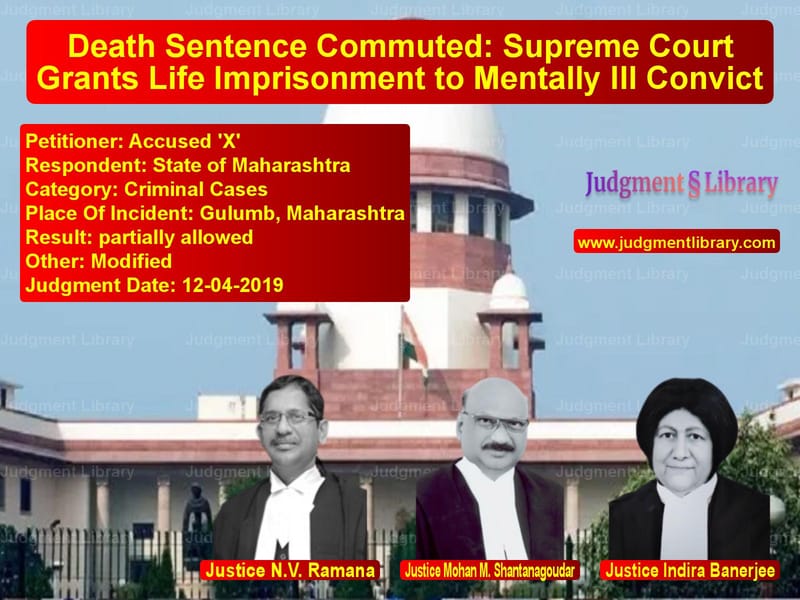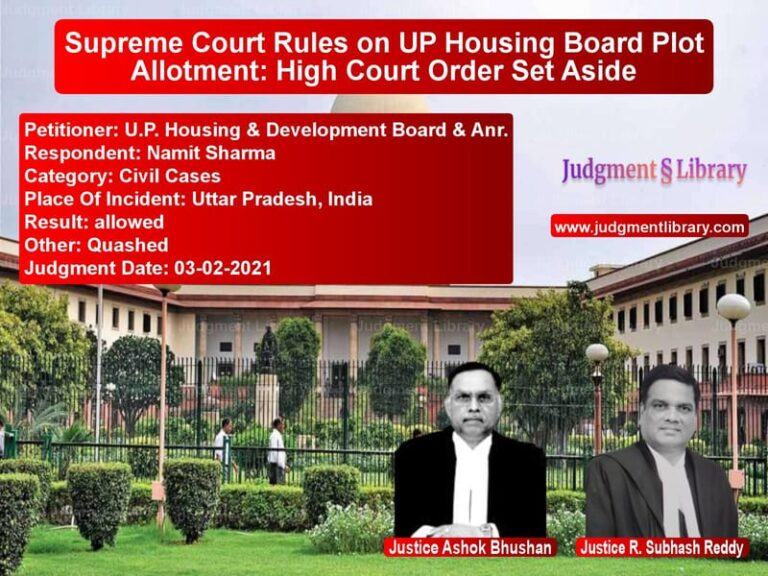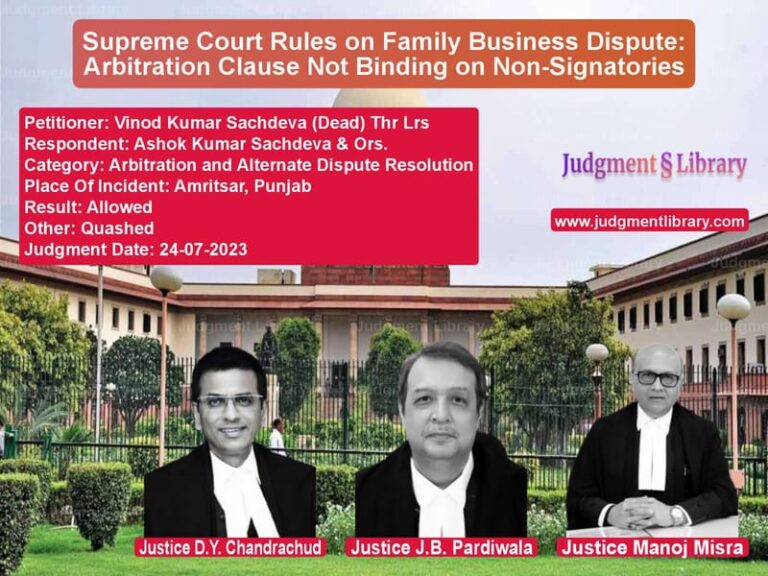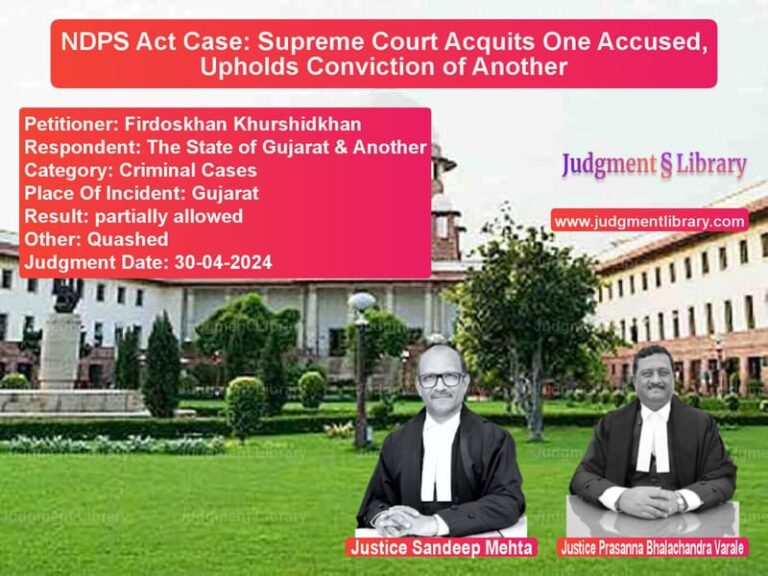Death Sentence Commuted: Supreme Court Grants Life Imprisonment to Mentally Ill Convict
The Supreme Court of India, in its judgment dated April 12, 2019, addressed a significant issue regarding the death penalty and mental illness in the case of Accused ‘X’ vs. State of Maharashtra. The case involved the brutal rape and murder of two minor girls, for which the petitioner was convicted and sentenced to death. The Supreme Court reconsidered the sentence, taking into account post-conviction mental illness, and commuted the death penalty to life imprisonment without remission.
Background of the Case
The petitioner, referred to as ‘Accused X’ to protect his identity under Section 23(1) of the Mental Healthcare Act, 2017, was convicted for the rape and murder of two minor girls in Gulumb, Maharashtra, on December 13, 1999. The prosecution presented strong circumstantial evidence, including forensic reports, recovery of bloodstained clothes, and an extra-judicial confession. The trial court sentenced him to death, and the High Court confirmed the conviction. The Supreme Court, in 2008, upheld the death penalty, considering it a ‘rarest of the rare’ case.
However, after spending nearly 17 years on death row, the petitioner filed a review petition, arguing that his deteriorating mental health should be considered as a mitigating factor.
Arguments by the Petitioner
- The petitioner’s counsel argued that he had developed severe mental illness after his conviction, rendering him unfit for execution.
- Relying on Shatrughan Chauhan vs. Union of India (2014) 3 SCC 1, the petitioner contended that executing a mentally ill prisoner violates Article 21 of the Indian Constitution.
- Medical reports from Yerawada Central Prison confirmed that the petitioner was under psychiatric treatment for over two decades, suffering from severe mental distress.
- It was submitted that Article 20(1) of the Constitution prohibits cruel and unusual punishment, which includes executing mentally ill prisoners.
Arguments by the Respondents
- The State of Maharashtra contended that mental illness should not be used as a defense to escape capital punishment.
- The prosecution relied on previous judgments affirming the death sentence, arguing that the crime’s brutality justified the penalty.
- Medical reports submitted by the state did not conclusively establish the severity of the petitioner’s mental illness.
Supreme Court’s Observations
The Supreme Court reviewed global legal principles and Indian jurisprudence on mental illness in death penalty cases. The key observations were:
- Post-conviction mental illness can be a mitigating factor: The court acknowledged that prolonged incarceration on death row could lead to psychological deterioration.
- Right to life and dignity under Article 21: The execution of a mentally ill convict who cannot comprehend the nature of the punishment violates constitutional principles.
- International human rights obligations: India is a signatory to the Convention on the Rights of Persons with Disabilities, which prohibits inhuman treatment of mentally ill individuals.
- Judicial precedents: Referring to Mohd. Arif vs. Registrar, Supreme Court of India (2014) 9 SCC 737, the court reaffirmed the right to oral hearings in death penalty review petitions.
Final Judgment
- The Supreme Court commuted the death sentence to life imprisonment without the possibility of remission.
- The petitioner will remain in prison for the rest of his life without any scope for parole.
- The State of Maharashtra was directed to ensure that the petitioner receives adequate psychiatric treatment under the Mental Healthcare Act, 2017.
- The court ruled that the case does not warrant execution but recognized the need for incapacitation through life imprisonment.
Legal Implications
- This ruling strengthens the principle that mental illness can be a mitigating factor in capital punishment cases.
- It reinforces that constitutional rights do not end at the prison gates and that dignity must be upheld even in punishment.
- The judgment aligns Indian jurisprudence with international human rights standards on the treatment of mentally ill convicts.
Conclusion
The Supreme Court’s decision in this case sets a critical precedent in the evolving jurisprudence on capital punishment and mental health. While acknowledging the gravity of the crime, the court balanced retribution with humanitarian considerations, ensuring that mentally ill convicts are not subjected to cruel and unusual punishment. This judgment marks a significant step in the protection of human rights within India’s criminal justice system.
Petitioner Name: Accused ‘X’.Respondent Name: State of Maharashtra.Judgment By: Justice N.V. Ramana, Justice Mohan M. Shantanagoudar, Justice Indira Banerjee.Place Of Incident: Gulumb, Maharashtra.Judgment Date: 12-04-2019.
Don’t miss out on the full details! Download the complete judgment in PDF format below and gain valuable insights instantly!
Download Judgment: Accused ‘X’ vs State of Maharashtra Supreme Court of India Judgment Dated 12-04-2019.pdf
Direct Downlaod Judgment: Direct downlaod this Judgment
See all petitions in Murder Cases
See all petitions in SC/ST Act Case
See all petitions in Judgment by N.V. Ramana
See all petitions in Judgment by Mohan M. Shantanagoudar
See all petitions in Judgment by Indira Banerjee
See all petitions in partially allowed
See all petitions in Modified
See all petitions in supreme court of India judgments April 2019
See all petitions in 2019 judgments
See all posts in Criminal Cases Category
See all allowed petitions in Criminal Cases Category
See all Dismissed petitions in Criminal Cases Category
See all partially allowed petitions in Criminal Cases Category







